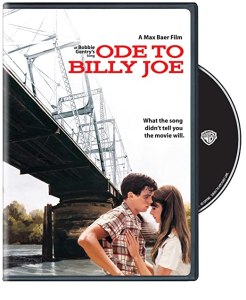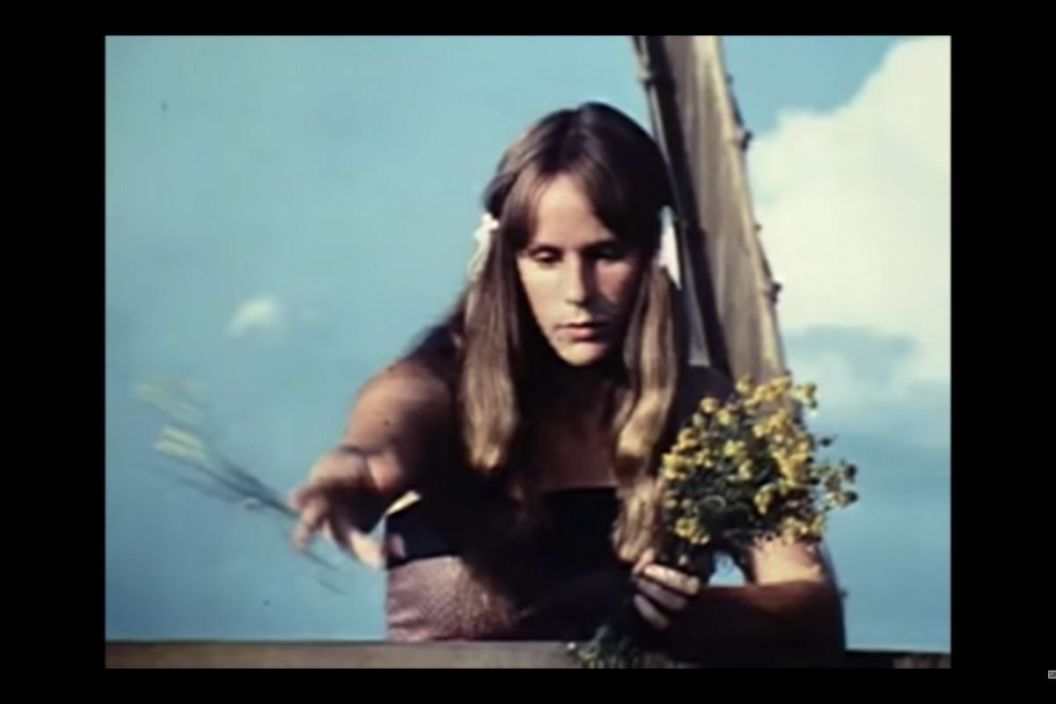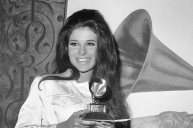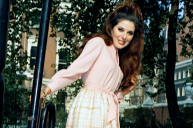"Ode to Billie Joe" by Bobbie Gentry is one of country's most impenetrable songs. Released in 1967, Gentry's odd composition tells the story of an unnamed narrator as she learns about the death — presumably suicide — of a local boy named Billie Joe McAllister during family dinnertime. The music, marked heavy string accompaniment, imbues each rhyming line with an uneasy tension.
This highly narrative form engaged listeners of the day; the hit song was #3 on the Billboard charts and earned three Grammy awards. But there is also a lesser-known tribute to the breakout single: a 1976 film (and concurrent novelization) entitled Ode to Billy Joe which reimagines the song's secretive context. It's no average love story.
Read More: The Story Behind Bobbie Gentry's Perplexing Hit
Bobbie Gentry's "Ode To Billie Joe"
It was the third of June, another sleepy, dusty Delta day
I was out choppin' cotton, and my brother was balin' hay
And at dinner time we stopped and walked back to the house to eat
And mama hollered out the back door, y'all, remember to wipe your feet
And then she said, I got some news this mornin' from Choctaw Ridge
Today, Billy Joe MacAllister jumped off the Tallahatchie Bridge
And papa said to mama, as he passed around the blackeyed peas
Well, Billy Joe never had a lick of sense; pass the biscuits, please
There's five more acres in the lower forty I've got to plow
And mama said it was shame about Billy Joe, anyhow
Seems like nothin' ever comes to no good up on Choctaw Ridge
And now Billy Joe MacAllister's jumped off the Tallahatchie Bridge
And brother said he recollected when he, and Tom, and Billie Joe
Put a frog down my back at the Carroll County picture show
And wasn't I talkin' to him after church last Sunday night?
I'll have another piece-a apple pie; you know, it don't seem right
I saw him at the sawmill yesterday on Choctaw Ridge
And now ya tell me Billie Joe's jumped off the Tallahatchie Bridge
And mama said to me, child, what's happened to your appetite?
I've been cookin' all morning, and you haven't touched a single bite
That nice young preacher, Brother Taylor, dropped by today
Said he'd be pleased to have dinner on Sunday, oh, by the way
He said he saw a girl that looked a lot like you up on Choctaw Ridge
And she and Billy Joe was throwing somethin' off the Tallahatchie Bridge
A year has come and gone since we heard the news 'bout Billy Joe
And brother married Becky Thompson; they bought a store in Tupelo
There was a virus going 'round; papa caught it, and he died last spring
And now mama doesn't seem to want to do much of anything
And me, I spend a lot of time pickin' flowers up on Choctaw Ridge
And drop them into the muddy water off the Tallahatchie Bridge
'Ode to Billy Joe'
The 1976 drama Ode to Billy Joe envisioned a full backstory to Bobbie Gentry's song from nine years prior. Directed by Max Baer Jr., of Beverly Hillbillies fame, with a screenplay by Herman Raucher who'd previously written Summer of '42. The story adhered to Gentry's lyrics — plus some creative liberties. In 1953, the film revolves around 15-year-old Bobbie Lee Hartley: a restless teen whose identity seems partially informed by Gentry's biography. In addition to the first name, Bobbie Lee is also a piano player. (In real life, Gentry's grandmother traded a dairy cow so little Bobbie could learn the instrument.)
Filmed entirely in the Mississippi Delta region, physically, Baer's film recalls the deep South setting of Gentry's original song. Viewers will see the Tallahatchie Bridge up on Chocktaw Ridge come to life for the first time, as wandering Bobbie Lee (Glynnis O'Connor) is accosted by an older boy with romantic intentions: Billy Joe McAllister (Robby Benson). Billy Joe is confident, showy, and unusual. Despite Bobbie Lee's self-proclaimed disinterest — and the wishes of her papa Glenn (Sandy McPeak) — the young man gets under her skin.
Of course, what Gentry fans will most wonder is how the film portrays the song's central conflict: whether Billy Joe, indeed, commits suicide and what exactly the pair were throwing off the Tallahatchie Bridge. Famous hypotheses have included a gun, a ring, or even a baby. Turns out, it's a rag doll, Bobbie Lee's childhood favorite. This is the incident that a suspicious Brother Taylor witnessed in Gentry's song. But the circumstances surrounding the rag doll accident are extremely complex. Throughout the movie, Billy Joe and Bobbie Lee grow closer until Billy Joe attends a drunken jamboree where he blacks out and disappears. Days later, Billy Joe and Bobbie Lee reunite but he's clearly tormented. As Bobbie Lee urges him to explain, the doll drops accidentally into the river. Bobbie Lee quickly forgives him though, and they begin to kiss. Until Billy Joe finally admits the truth: at the jamboree, he was violated by his sawmill boss Dewey Barksdale (James Best).
Billy Joe is crying, miserable, condemning what he calls "sinful" behavior. Bobbie Lee is quick to overlook the transgression — "You were drunk!" — but Billy Joe insists that he knew what he was doing. Even in his inebriated state. It's left unclear the extent to which Billy Joe considers himself a victim of assault or whether he's truly unsure where his desires lie. To his credit, Benson's portrayal of the teen is messy and complex. Like in Gentry's lyric, Billy Joe emerges from the backdrop of Chickasaw County quite memorably. And like in Gentry's lyric, his performance resists obvious interpretation.
Soon after their encounter, Billy Joe jumps off the Tallahatchie Bridge and dies. The townspeople naturally suspect he'd knocked Bobbie Lee up, and the poor girl is left to make a tough decision. Rather than appear as having had an abortion, she elects to leave town entirely. On her way out, she runs into Barksdale who expresses guilt over Billy Joe's fate. He wants to come clean but having known Billy Joe's shame, Bobbie Lee asks him to keep the secret for good. "I mean we can't have people believe Billy Joe McAllister jumped off the bridge for a man, can we?" she asks wryly. The final shot pictures this unlikely pair together, on the Tallahatchie Bridge, as Barksdale offers Bobbie Lee a ride to the bus station. A re-recording of Gentry's song then plays again, functioning now as a literal epilogue against album-style photos of the Hartley family.
Ode to Billy Joe performed well for Warner Bros., earning $27 million box office on a budget of $1 million. Additionally, the film caused a resurgence of popularity for the old track. Gentry recorded this again as "Ode to Billy Joe" as a correction on what she called a typographical error. Gentry's original handwritten notes for the song feature the y-spelling. Despite all that, Ode to Billy Joe was poorly rated. The film critic Roger Ebert, who actually commended various actors in the work, spoke to why in his 1976 review:
"Now that I know why Billy Joe McAllister jumped off the Tallahatchie Bridge, I almost wish I didn't. Bobbie Gentry's famous song, on which "Ode to Billy Joe" is based, found much of its haunting effect in its refusal to reveal why Billy Joe killed himself. His death was seen as sad, and long ago, and unnecessary, and the singer recalled it as a key event in an unhappy time. Gentry didn't need to explain because she evoked."
There's no answer which would have satisfied all Gentry fans. Gentry understood that! But in this case, Billy Joe's unnecessary demise is especially depressing.
An Enduring Mystery
Before the production of Ode to Billy Joe, Max Baer Jr. offered Bobbie Gentry and her publisher a sizable cut. So in addition to recording new material for the film, Gentry was heavily involved with the project. She also continued to work as a singer-songwriter and remained an active musician well into the 1980s. That's when Gentry vanished, suddenly, from the spotlight. She never performed again and refuses to partake in interviews about her extensive body of work.
According to The Washington Post, Gentry now lives in a $1.5 million house just two hours from the original site of the Tallahatchie Bridge. She's true to her Mississippi roots. But her reluctance to engage with fans has only shrouded her 1967 classic in further mystery. So if you are still curious about the possible meaning behind "Ode to Billie Joe," check out Ode to Billy Joe now on Amazon Prime. Baer's movie does not have all the answers but is good for a dose of Southern Gothic charm. Rent it today for less than $4.
Editor's Note: Products featured on Wide Open Country are independently selected by our editors. However, when you buy something through our links, we may earn a commission.

[buy now link=amzn.to/371dioT]




